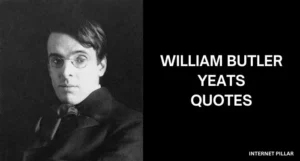Shinichi Suzuki was a Japanese violinist, musician, philosopher and educator.
He was the founder of the International Suzuki Method of Music Education.
He developed a philosophy for educating people of all ages and abilities.
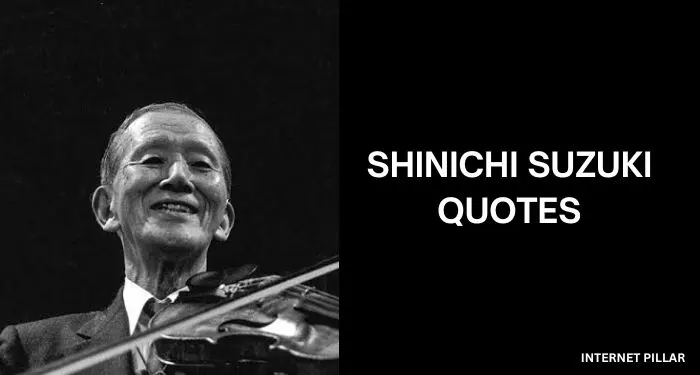
Here are some of the famous quotes by Shinichi Suzuki.
Best Shinichi Suzuki Quotes

1. “Music is the language of the heart without words.” ~ (Shinichi Suzuki).

2. “Perhaps it is music that will save the world.” ~ (Shinichi Suzuki).
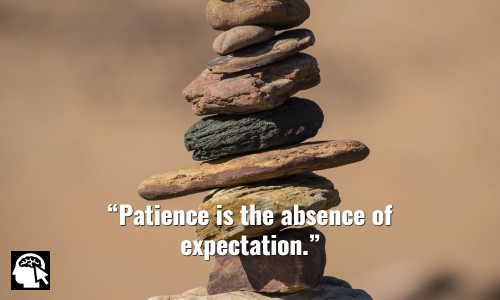
3. “Patience is the absence of expectation.” ~ (Shinichi Suzuki).

4. “Knowledge is not skill. Knowledge plus ten thousand times is skill.” ~ (Shinichi Suzuki).

5. “The heart that feels music will feel people.” ~ (Shinichi Suzuki).
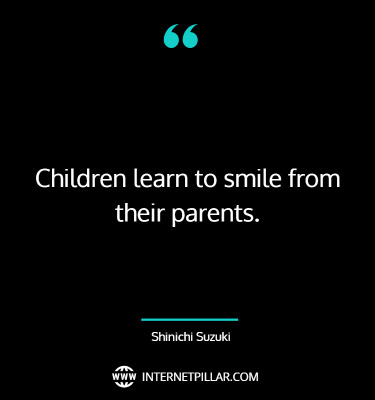
6. “Children learn to smile from their parents.” ~ (Shinichi Suzuki).
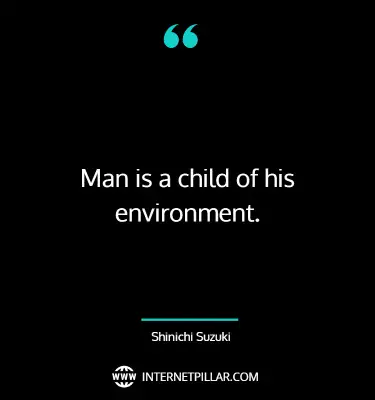
7. “Man is a child of his environment.” ~ (Shinichi Suzuki).

8. “If children hear fine music from the day of their birth and learn to play it, they develop sensitivity, discipline and endurance. They get a beautiful heart.” ~ (Shinichi Suzuki).
Famous Shinichi Suzuki Quotes
9. “Talent is no accident of birth. In today’s society a good many people seem to have the idea that if one is born without talent, there is nothing he can do about it; they simply resign themselves to what they consider to be their fate.” ~ (Shinichi Suzuki).
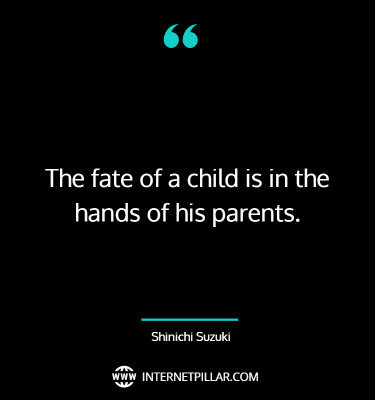
10. “The fate of a child is in the hands of his parents.” ~ (Shinichi Suzuki).
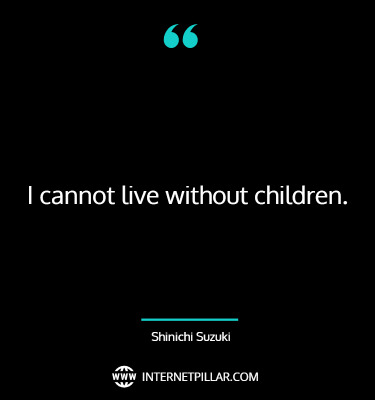
11. “I cannot live without children.” ~ (Shinichi Suzuki).
12. “Musical ability is not an inborn talent but an ability which can be developed. Any child who is properly trained can develop musical ability just as all children develop the ability to speak their mother tongue. The potential of every child is unlimited.” ~ (Shinichi Suzuki).

13. “If a musician wants to become a finer artist, he must first become a finer person.” ~ (Shinichi Suzuki).
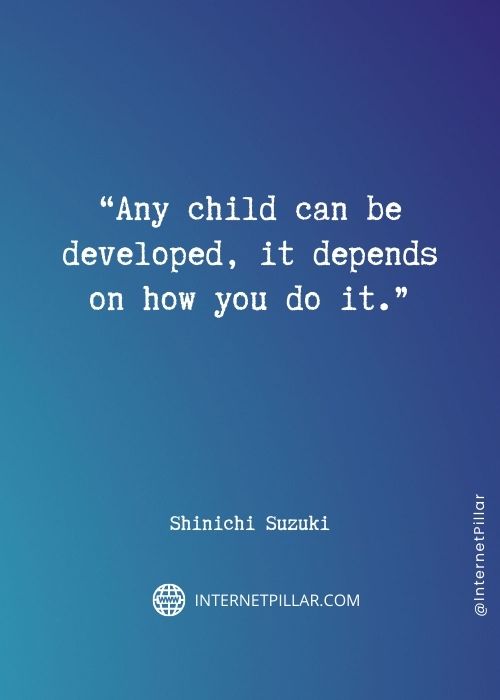
14. “Any child can be developed, it depends on how you do it.” ~ (Shinichi Suzuki).

15. “If I simply do my best, I cannot complain even if I am taken to hell.” ~ (Shinichi Suzuki).
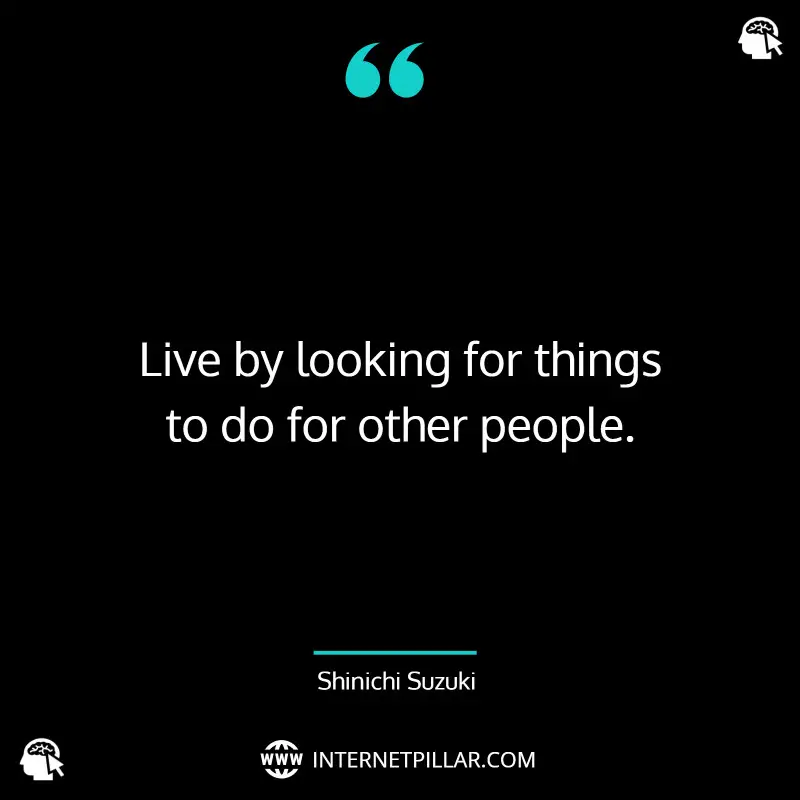
16. “Live by looking for things to do for other people.” ~ (Shinichi Suzuki).
17. “Art is not in some far-off place. A work of Art is the expression of a man’s whole personality, sensibility and ability.” ~ (Shinichi Suzuki).
18. “An unlimited amount of ability can develop when parent and child are having fun together.” ~ (Shinichi Suzuki).
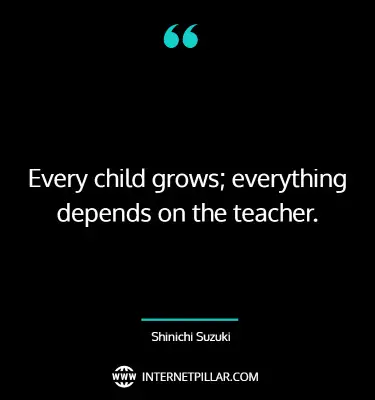
19. “Every child grows; everything depends on the teacher.” ~ (Shinichi Suzuki).
20. “What is man’s ultimate direction in life? It is to look for love, truth, virtue, and beauty.” ~ (Shinichi Suzuki).
Popular Shinichi Suzuki Quotes

21. “It is necessary to be concerned about the importance of educating a really beautiful human spirit.” ~ (Shinichi Suzuki).

22. “It is in our power to educate all the children of the world to become a little better as people, a little happier.” ~ (Shinichi Suzuki).
23. “Wrong education and upbringing produces ugly personalities, whereas a fine upbringing and good education will bring forth superior sense and feeling, as well as nobility and purity of mind.” ~ (Shinichi Suzuki).
24. “I have come to the definite conclusion that musical ability is not an inborn talent but an ability which can be developed.” ~ (Shinichi Suzuki).
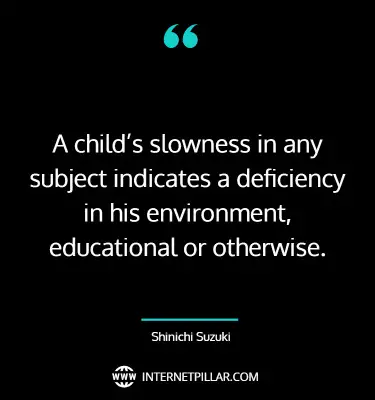
25. “A child’s slowness in any subject indicates a deficiency in his environment, educational or otherwise.” ~ (Shinichi Suzuki).
26. “We all have unlimited shortcomings. Yet one way of seeing things is to consider our lives as a time frame that allows us continually to work at changing our weaknesses into strengths. This, I must say, is an intriguing task.” ~ (Shinichi Suzuki).
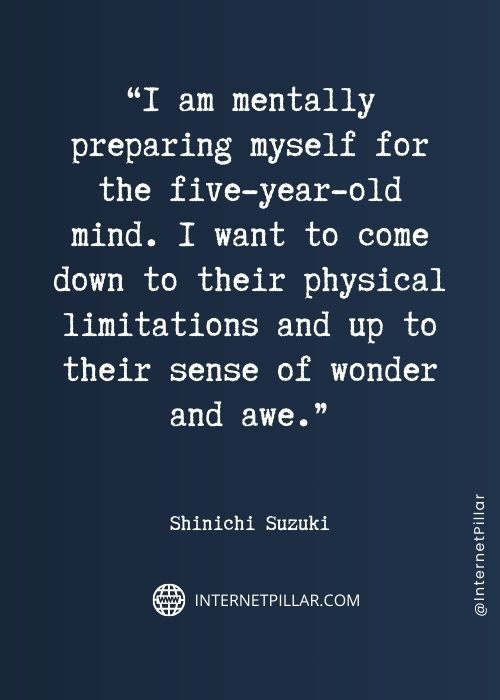
27. “I am mentally preparing myself for the five-year-old mind. I want to come down to their physical limitations and up to their sense of wonder and awe.” ~ (Shinichi Suzuki).
28. “Art Exists for the human species. I think that all of the people who love art, those who teach art, and all of you should burn with the obligation to save the world.” ~ (Shinichi Suzuki).
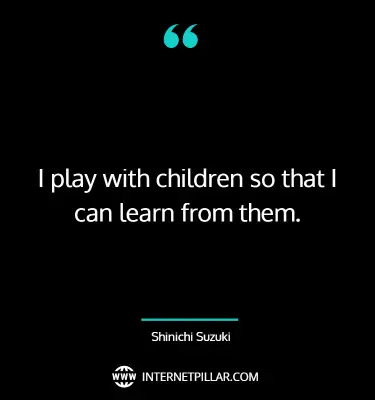
29. “I play with children so that I can learn from them.” ~ (Shinichi Suzuki).
30. “Music exists for the purpose of growing an admirable heart.” ~ (Shinichi Suzuki).

31. “Practise only as many times as you have breakfast.” ~ (Shinichi Suzuki).
32. “Tone has the living soul.” ~ (Shinichi Suzuki).
33. “The real essence of art turned out to be not something high up and far off – it was right inside my ordinary daily self – If a musician wants to become a finer artist, he must first become a finer person.” ~ (Shinichi Suzuki).
Other Posts You Might Like
- Shauna Niequist Quotes
- Watchman Nee Quotes
- Cinderella Quotes
- Mary Oliver Quotes
- Ravi Zacharias Quotes
- Stuart Wilde Quotes
- Chris Cornell Quotes
- Paul Washer Quotes
- Peter Marshall Quotes
Short Biography of Shinichi Suzuki
Shinichi Suzuki, born in Nagoya, Japan, in 1898, revolutionized music education with his Suzuki method, making it possible for children, regardless of their initial abilities, to learn music from a young age.
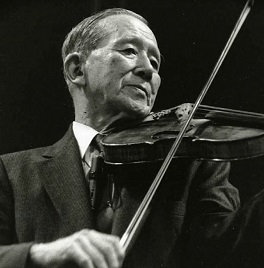
Suzuki, a self-taught violinist, challenged traditional music education norms by not requiring student auditions and emphasizing character development through music.
Despite controversies over his credentials and educational background, Suzuki’s impact on music education profoundly led to numerous accolades, including being named a Living National Treasure of Japan.
| Full Name | Shinichi Suzuki |
| Also known as | Shin’ichi Suzuki |
| Born | 17 October 1898, Nagoya, Aichi, Japan |
| Died | 26 January 1998 (age 99 years), Matsumoto, Nagano, Japan |
| Occupation(s) | Musician, violinist, pedagogue, philosopher |
| Genres | Classical |
| Instrument | Violin |
| Origin | Japan |
| Education | Berlin University of the Arts |
| Parents | Masakichi Suzuki |
| Spouse | Waltraud Prange |
His early life was marked by his work in his father’s violin factory and a transformative trip to Germany, where he claimed to have studied under notable figures.
Suzuki’s resilience was evident during World War II, enduring personal and professional challenges.
He continued to innovate in music education until his passing in 1998, leaving a legacy that transformed the teaching and learning of music worldwide.
Quick Facts about Shinichi Suzuki
- Shinichi Suzuki was born on October 17, 1898, in Nagoya, Japan.
- He was one of twelve children in his family.
- Suzuki started learning violin at 17, self-taught by imitating recordings.
- He traveled to Germany at 26, claiming to study under Karl Klingler and Albert Einstein.
- Suzuki’s educational and professional credentials have been scrutinized for accuracy.
- He married Waltraud Prange during his time in Germany.
- Suzuki pioneered the Suzuki method of music education, focusing on children’s early learning.
- He believed in the innate ability of all children to learn, given the right environment.
- Suzuki emphasized developing students’ character alongside their musical skills.
- His approach was revolutionary in accepting young children without auditions.
- Suzuki was instrumental in the early training of prominent Japanese violinists in the West.
- He received several honorary doctorates and was nominated for the Nobel Peace Prize in 1993.
- Suzuki worked in his father’s violin factory as a child, where he was first exposed to violins.
- Despite initial resistance, Suzuki’s father eventually allowed him to pursue music.
- After returning to Japan, Suzuki formed a string quartet with his brothers and began teaching.
- World War II led to the conversion of the family’s violin factory and subsequent bombing.
- Post-war, Suzuki was invited to teach at a new music school, focusing on teaching young children.
- He adopted his prewar student Koji, who had become an orphan.
- Suzuki continued teaching in Matsumoto with his wife after the war.
- He passed away at 99, on January 26, 1998, in Matsumoto, Japan.
- Suzuki’s method is based on the idea that talent can be nurtured in any child.
- He drew parallels between learning music and acquiring a mother tongue.
- The Suzuki method emphasizes environmental influence on learning.
- Early learning and repetition are key principles in his approach.
- Suzuki advocated for continuous growth and improvement of teachers and parents.
- His pedagogy employs specific illustrations and methods for effective child learning.
- Suzuki’s philosophy is “character first, ability second.”
- He believed that every child has the potential to learn and develop skills.
- Teachers trained by Suzuki spread his method worldwide.
- “The Suzuki method” is a blend of educational philosophy and a practical approach to music teaching, focusing on the child’s holistic development.
Top Questions about Shinichi Suzuki
A: Suzuki teachers employ creative techniques like musical games, recitals with stuffed animals, and rhythm and movement classes to make music study enjoyable.
A: Dr. Shinichi Suzuki died in 1998 at the age of 99.
A: Dr. Shinichi Suzuki, born in Nagoya, Japan in 1898, founded the Suzuki method.
A: The Suzuki method for violin consists of 10 books.
A: Shinichi Suzuki was a violinist, educator, and the founder of the Suzuki method, focusing on educating children of all ages and abilities in music.
A: Shinichi Suzuki began teaching himself the violin at the age of 17.
A: Suzuki went to Germany for his music studies and claimed to have studied under Karl Klingler and Albert Einstein.
A: Suzuki employed the “Talent Education” philosophy, believing that talent can be developed in any child.
A: During World War II, Suzuki’s father’s violin factory was bombed by American warplanes, resulting in his brother’s death.
A: Suzuki’s primary goal was to open a world of beauty to children everywhere for greater enjoyment in their lives through music.
A: Suzuki believed that the “mother language” method, where children learn through observation of their environment, was key to human development.
A: After studying in Germany, Suzuki returned to Japan, formed a string quartet with his brothers, and began teaching, focusing on young students’ music education.
A: Suzuki’s educational background and endorsements, such as his claimed tutelage under Karl Klingler and Albert Einstein, were scrutinized.
A: Suzuki’s guiding principle was “character first, ability second,” emphasizing that any child can learn.


